The poultry industry is an important part of the agriculture sector. Broilers are chickens that are bred and raised specifically for meat production. The broiler industry has undergone significant changes in recent years as the use of antibiotics in livestock has come under scrutiny.
There are a few different ways to help chickens grow faster. Some farmers give their chickens testosterone supplements to help them bulk up. Others give them antibiotics to help them stay healthy and fight disease. There are pros and cons to both of these methods, but in the end, the primary objective of the broiler farmer is to make his broiler chickens grow bigger or weightier.
The poultry industry has made great strides in the past decade with the use of additives to help chickens grow bigger and faster. Some of these additives, such as arsenic, are controversial, while others, such as probiotics, are seen as safer for health. In this blog post, we will provide an overview of the chicken or broiler booster, when to give a broiler booster and some best natural broiler growth boosters or enhancers.
Importance of Weight to Broiler Farmers
Almost all poultry farmers aim to get maximum profits from their birds. The profit a broiler farmer would get on a chicken lies mainly in the body weight. The higher the body weight of a bird, the higher the price it will command.
We wrote an article on how to increase the weight of broiler chickens. In the article, we mentioned the following tips as broiler weight-boosting methods.
- Sort the broilers according to their sizes and weights
- Formulate and feed them with quality feed
- Use growth promoter or booster
- Avoid starvation
- Procure quality chicks from an excellent hatchery
So the third tip, use a growth promoter or booster, is our focus in this post.
Read: Top 5 Reasons for Poor Broiler Growth and the Solutions
What is a chicken growth booster?
A chicken growth booster is a substance that is added to chicken feed, water or body in order to promote rapid growth in the birds. It could also be a type of feed additive that is used to improve the growth and overall performance of chickens.
Broiler boosters are typically made up of a variety of different vitamins, minerals, and other nutrients that help to support the health and development of the chickens. As a result, using a broiler growth booster can lead to increased weight gain, improved feed efficiency, and better overall health for the chickens.
When to give broiler booster?
A broiler booster can be given to a broiler chicken when it is around three weeks old. There are some broiler boosters that could be given right from day one. However, it is advised to allow the broiler chicken to grow up to 3-4 weeks old before adding growth boosters to their feed to avoid rapid organ growth which could also lead to sudden broiler death.
It is best to follow the manufacturer’s instructions or consult with a veterinarian to see what is the best time for the individual chicken.
Types of Chicken Growth Boosters
There are two types of chicken growth boosters: organic and inorganic. Chicken growth boosters can also be classified as either natural or artificial (synthetic).
Inorganic or Artificial Growth Boosters
Inorganic chicken boosters are those that are made from synthetic materials or chemicals and are mostly manufactured in a laboratory. There are a variety of substances that can be classified as synthetic broiler growth promoters. These include antibiotics, hormones, and other medications used to promote growth in poultry.
Antibiotics
One of the most controversial growth boosters is the use of antibiotics in poultry. Critics argue that the indiscriminate use of antibiotics in livestock contributes to the development of antibiotic-resistant bacteria, which can pose a serious threat to public health. Supporters of antibiotic use in poultry argue that it is necessary to maintain healthy and productive livestock populations.
Hormones
Hormones are another type of synthetic growth booster often used in poultry production. Hormones are used to promote faster growth and increased feed efficiency in broiler chickens. Some consumer groups have raised concerns about the potential health risks posed by hormones in meat and poultry products. However, there is limited evidence that hormones in meat and poultry products pose any significant health risks.
Read: Beginner’s Guide to Raising Broilers from Start to Finish
Organic or Natural Growth Boosters
Organic growth boosters are those that are derived from natural substances. Natural growth boosters are those that come from plant or animal sources. There are a few types of organic broiler growth boosters. Some common boosters include probiotics, organic herbs, and organic minerals.
These boosters help to improve the overall health and growth of broilers. They can be added to feed or water, depending on the product.
There are a lot of different opinions on organic broiler boosters or promoters. Some farmers attest to the effectiveness of these organic broiler growth boosters, while others think they are a waste of money. Here’s a look at some of the pros and cons of using organic growth boosters.
Advantages of organic chicken boosters
- Organic boosters provide a number of essential nutrients that chickens need to stay healthy and grow properly.
- They can help improve your chickens’ immune system, helping them stay healthy and productive.
- Organic chicken growth boosters are made with natural ingredients, so they are a more sustainable choice than chemical additives.
- They can help increase your chickens’ egg production and improve the quality of their eggs.
Disadvantages of organic chicken boosters
- Organic chicken growth boosters can be a bit more expensive than other types of chicken supplements.
- Some people find that they don’t see a noticeable difference in their chickens’ growth or productivity when using organic chicken growth boosters.
- There is a chance that your chickens could become dependent on the organic boosters, and their egg production may decline if you stop using them.
Homemade Broiler Booster
Scientific researchers and experts have proven that organic growth promoters are safe for human health while inorganic growth promoters like antibiotic growth promoters are unsafe for our health.
Some of the common natural plant-based growth promoters for chickens are presented below. The advantage also is that they could be referred to as homemade broilers that you can make yourself.
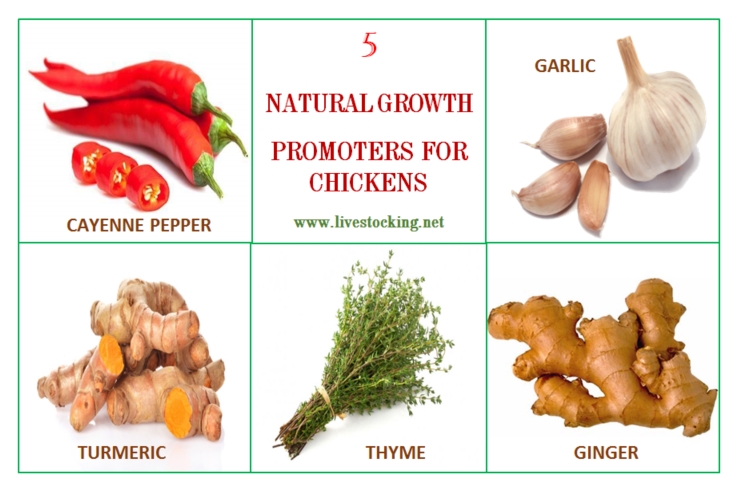
1. Cayenne Pepper / Hot Red Pepper
Cayenne pepper (also called hot red pepper) is one of the readily available natural or organic growth promoters. When added to the diet of chickens or other poultry birds, it increases or boosts appetite and feed consumption or metabolism. Cayenne pepper is also known to kill gastrointestinal worms and is effective in the treatment of coccidiosis. A scientific study[1] has shown that cayenne pepper powder at an inclusion rate of 0.5-1 g/100 g of broiler feed, works great in boosting the body weight of broilers.
How to make cayenne pepper powder at home:
- Spead the cayenne peppers on a flat metal container and allow them to dry in the sun for several days. If that would take long for you, then use an oven.
- Preheat the oven to 200oF (93oC).
- Spread cayenne peppers on a baking sheet and roast in the oven until the peppers are completely dried out.
- Remove the dried peppers from the oven and let them cool completely.
- Place the dried peppers in a food processor or blender and grind them into powder.
- Store the cayenne pepper powder in an airtight container.
2. Garlic
Garlic is an onion family member, garlic is a vegetable (sometimes classified as a spice) that helps in boosting the immune system, fighting viral and bacterial diseases, improving egg production as well as boosting growth. Research[2] has shown that Garlic powder, with an inclusion rate of 2-3 g/1 kg of broiler feed, results in higher growth performance.
How to make garlic powder at home:
Garlic powder is made from dried garlic cloves. To prepare garlic powder:
- First, peel the cloves of garlic. Then, cut off the root end and cut each clove in half.
- Spread the cloves out on a baking sheet and oven-dry at 200oF (93oC) until the cloves are dry and brittle.
- Once they are cool, place them in a food processor or blender and grind until they turn into powder.
- Store the garlic powder in an airtight container.
3. Turmeric
Turmeric is a spice that is highly rich in curcumin, a chemical that works as an anticoccidial, antibacterial, antioxidant and anti-inflammation. Turmeric’s potency as a natural growth promoter has been researched by many scholars and the results were positive and impressive. For example, turmeric powder at an inclusion rate of 0.75% of broiler feed results in improved growth performance and feed conversion ratio (FCR).[3]
How to make turmeric powder at home:
- Preheat the oven to 200oF (93oC).
- Spread a single layer of turmeric roots on a baking sheet and roast in the oven until the roots are brittle and have turned a deep golden-brown color.
- Let the roasted roots cool slightly, then transfer them to a spice grinder or blender and grind them into a fine powder.
- Store the turmeric powder in an airtight container.
4. Ginger
Ginger is another natural growth promoter that can be used as an alternative to artificial poultry growth promoters. Adding ginger to the diet of broilers shows a strong stimulating effect on the immune and digestive systems of birds. Hence, ginger can be used as an immune response booster and appetite booster. Studies [4,5] show that at an inclusion level of 1%, broiler chickens have a significantly higher body weight gain and lower FCR.
How to make ginger powder at home:
- Thoroughly rinse and dry ginger root.
- Peel off the brown skin and finely chop or grate the ginger root.
- Spread the chopped ginger on a baking sheet and bake at 200oF (93oC) until the ginger is very dry.
- Allow the ginger to cool then place it in a spice grinder or blender and grind it into powder.
- Store the ginger powder in an airtight container.
5. Thyme
Thyme is not only for culinary purposes. It can also boost the growth of chickens just like ginger, turmeric, cayenne pepper and garlic. The effectiveness of the use of thyme as a growth promoter has been proven by researchers. Dried thyme powder at an inclusion rate of 1 g/1 kg results in higher body weight gain and a lower feed conversion ratio. [6][7]
How to make thyme powder at home:
- Preheat the oven to 180ºF (80ºC).
- Spread thyme leaves on a baking tray and bake them for 1-2 hours or until the leaves are crispy.
- Let the leaves cool, then grind them into a powder using a coffee or spice grinder.
- Store the thyme in an airtight container.
The Use of Probiotics as Chicken Growth Boosters & Promoters
What are Probiotics?
Probiotics are living microorganisms that, when administered in adequate amounts, confer a health benefit on the host. Probiotics have been used as feed additives for more than 60 years and are now included in the diets of chickens around the world. The use of probiotics in poultry has been shown to improve weight gain and feed conversion efficiency, stimulate innate immunity, and reduce diarrhea. Probiotic supplementation of the diet can also improve the texture and flavor of meat and eggs.
The most common probiotics used in poultry are lactic acid bacteria (LAB), including Lactobacillus and Pediococcus. The benefits of probiotic supplementation depend on the strain of bacteria and its ability to survive and proliferate in the host intestine. Not all strains are effective in all hosts, so the selection of a probiotic for use in poultry should be based on the results of laboratory studies.
How do Probiotics work?
Probiotics work by colonizing the intestinal tract and competitively inhibiting the growth of harmful bacteria. They also produce lactic acid and other antimicrobial compounds that help to maintain healthy gut microbiota. Probiotics can also stimulate the immune system, which helps to protect against infection.
There are many different types of probiotics for chickens, and each has a unique way of affecting the gut microbiome of chickens. Some probiotics work by creating a barrier against harmful bacteria, while others stimulate the growth of friendly bacteria. Probiotics can also affect the chicken gut microbiome in other ways, such as by producing beneficial enzymes or nutrients.
Benefits of Probiotics in Chickens
The use of probiotics in chickens is becoming increasingly popular, as research indicates that they can offer a number of health benefits. Some of the key benefits of using probiotics in chickens include:
- Promotion of gut health: Probiotics can promote a healthy gut microbiome by increasing the numbers of beneficial bacteria and reducing the number of harmful bacteria. This can help to protect chickens from diseases caused by harmful bacteria, and may also improve overall gut health.
- Reduced inflammation: Probiotics can help to reduce inflammation in the gut, which can lead to improved overall health.
- Improved digestion: Probiotics can help to improve digestion by stimulating the growth of beneficial bacteria in the gut. This can help to break down food more efficiently and improve the absorption of nutrients.
- Enhanced immunity: Probiotics can enhance immunity by helping to stimulate the activity of immune cells. This can help to protect chickens from disease and infection.
Best Probiotics Growth Boosters for Chickens
Cited Sources and Further Reading
- Puvača, Nikola, et al. “Effect of garlic, black pepper and hot red pepper on productive performances and blood lipid profile of broiler chickens.” European Poultry Science 79 (2015): 1-13.
- Oloyede, T. A., and A. O. Fasuyi. “Garlic (Allium sativum) Powder as an Additive in Broilers (Finisher Phase) Part 2: Growth Performance, Hypocholesterolemic Effect and Economic Implications.” Journal of Experimental Agriculture International (2017): 1-14.
- Choudhury, Dimpi, et al. “Effect of Dietary Supplementation of Turmeric (Curcuma longa) Powder on the Performance of Commercial Broiler Chicken.”
- Talukder, Sudipta, et al. “Effect of dietary supplementation of ginger extract on growth, carcass characteristics and haematological parameters in broilers.” Asian Journal of Medical and Biological Research 3.2 (2017): 211-215.
- Mohamed, Arkan B., Mohammed AM Al-Rubaee, and Ali G. Jalil. “Effect of Ginger (Zingiber officinale) on Performance and.” International Journal of Poultry Science 11.2 (2012): 143-146.
- Demir, E., et al. “The use of natural feed additives as alternatives to an antibiotic growth promoter in broiler diets.” Archiv fur Geflugelkunde 69.3 (2005): 110-116.
Last update on 2023-12-11 at 17:55 / Affiliate links / Images from Amazon Product Advertising API
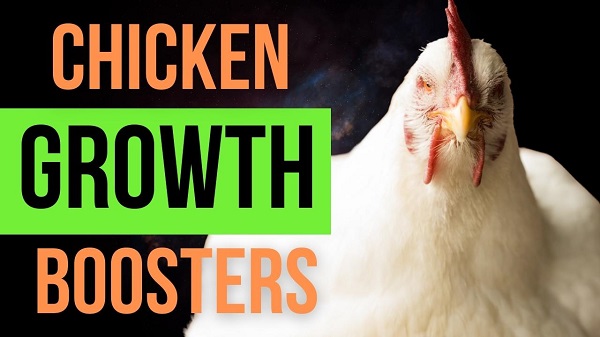



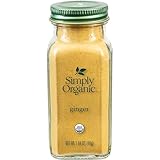






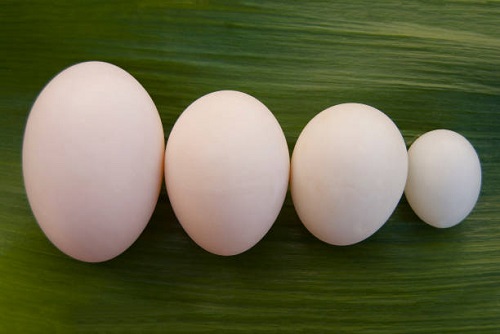
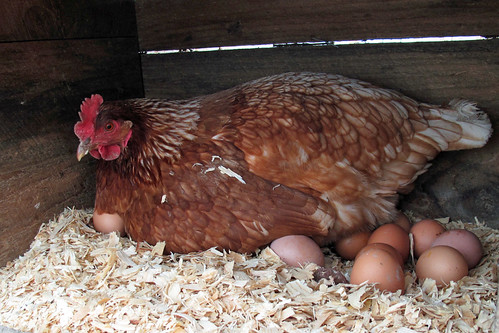
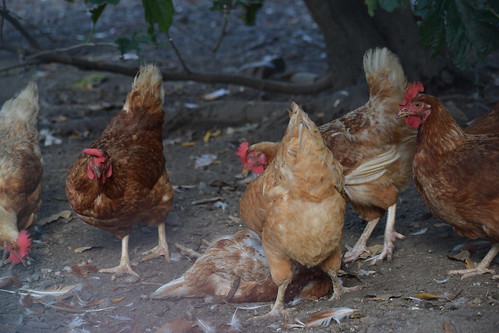
Hello About Akinbobola A.,
I would like to know if you can use all of these Natural Growth Promoters at once.
No, it is not advised.
Thanks for tips.
Are this natural growth promoter to be combine or one have to choose any of them.
It is not advised to combine all. Choose one and try its effectiveness.
I would like to know if you can use all of these Natural Growth Promoters at once.
No, it is not advised.
Which of the 5 gives optimal result in higher body weight and size, please?
I’d have to recheck and update the post. Thanks
What antibiotics are needed for making big broilers such as buffalo wings
Thanks so much for being a blessing to us farmers
Thanks a lot. At how many days old should I start giving organic weight booster
You can start at 3 weeks
How long do one give both the organic or inorganic growth booster for chickens to chickens and at what stage can one start it?
Hi I am a new farmer.
Pls I can I mix the turmeric for my chicken
Yes, you can
I appreciate your efforts sir????
Can you tell me why it is not advised to use them all at once?
Just like combining and using 5 drugs doing same thing.
Can I combine garlic and ginger for poultry
Yes, you can. Regards
kind regards, kindly enlighten more on the duration and stages at which one can use these organic supplements!
can these organic boosters be additive to drinking water instead of mixing with food
Yes, but the best way is by mixing with feed.
God bless u for ur teachings.
Pls l want to know the name probiotic l can buy or how l can prepare mine naturally
Can i use the garlic/tumeric from supermarket and do i add to the water or food and into which ratio?
Yes, you can. Add to the feed in the ratio 1 to 100.
I don’t understand this ratio. Please be more explicit. Thanks
Like how many days will I start to give my brolier garlic
You could start from day 5.